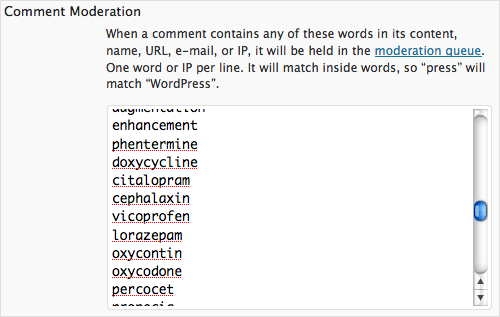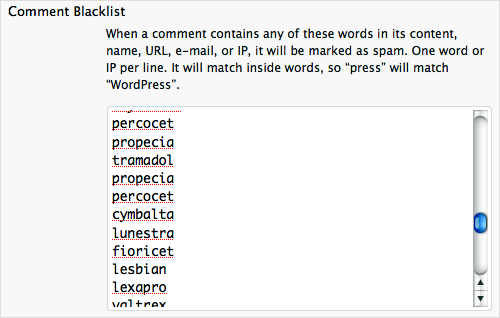How can WordPress websites most effectively deal with Spam Users who add poor content
The best answer to your question,
I think one of the biggest WordPress myths is that you need a bunch of plugins to control comment spam. Pretty much all of the posts out there on preventing WordPress comment spam are telling you to install some list of “must-have” anti-spam plugins. Some authors insist that you need only a few “choice” plugins, while others advise you to load up on everything you can get your hands on. Such advice is all well-intentioned, I’m sure, but it’s all based on the assumption that plugins are actually necessary to control comment spam. They’re not. WordPress is well-equipped to handle the job all by itself. Plugins may provide additional anti-spam functionality, but they are by no means essential to running a spam-free site.
Not even Akismet..
“Sure,” you are thinking, “you don’t need any plugins except for Akismet.” I mean, you definitely need that plugin, right? After all, it’s included with WordPress, so it’s got to be important. Umm, not so much. Yes, there are certain blogs that would probably be wise to take advantage of the additional spam-protection that Akismet might provide, but for 99% of the sites out there, it really isn’t necessary.
WordPress is strongenough..
I think one of the most underratedstrengths of WordPress is its built-in anti-spam functionality. With an ounce of knowledge and a pound of forethought, you can configure your WordPress Discussion settings to act as a powerful and effective defense against the evil forces of spam. No plugins required! Let’s look at WP’s anti-spam tools and see why they’re all you need for a spam-free site..
Default article settings
First up, consider your default article settings. If comments aren’t enabled, of course you know that you don’t need Akismet or any other anti-spam plugin for that matter. If comments are enabled, you can cut out a significant portion of spam by simply disallowing pingbacks and trackbacks. By clicking a single checkbox, all of that crap that comes rolling in as trackback spam will stop. That’s a huge step right there, and it will eliminate every plugin that has anything to do with displaying or controlling ping/trackbacks.
By clicking a single checkbox, all of that crap that comes rolling in as trackback spam will stop. That’s a huge step right there, and it will eliminate every plugin that has anything to do with displaying or controlling ping/trackbacks.
Comment author must fill out name and e-mail
Another smart move, although I think most sites do this one already. By requiring your commentators to at least fill out these two fields (even if it is just dummy data most of the time), you brush off all of those lazy spammers who are picking up the easy ground fruit. Most legitimate commentators don’t mind filling in this info because they usually have something they want to say. Lazy spammers, not so much.
Users must be registered and logged in to comment
If possible given the specific goals of your site, requiring users to log in before commenting is an extremely effective way of preventing comment spam. Although requiring registration will stop a lot of legit comments as well, it is a powerful deterrent to lazy spammers and completely stops automated scripts. Sure, you may still get some trolls stinking up the place, but you would be getting those anyway. Plus, if they’re registered, it makes it easier to deal with them.
Sure, you may still get some trolls stinking up the place, but you would be getting those anyway. Plus, if they’re registered, it makes it easier to deal with them.
Automatically close comments on articles older than X days
This is my favorite WordPress anti-spam feature. For a long time, we needed a plugin to get this done, but now that it is built into WordPress, everyone should be using it. Here at Digging into WordPress, we close comments on old posts after 90 days, which seems to be just about the right amount of time. Anything longer than that, and your posts begin to get targeted by spammers and automated spam scripts. Especially if your posts tend to do well and build up a lot of page rank, they will be prime targets for spam as time rolls on.
Break comments into pages with X comments per page
This one’s not as obvious, but it is also a great way to reduce the incentive to spam your site. Spammers target strongpages for their junk, so by breaking your comments into pages of, say, 20 comments each, you get the best comments on the first page (the same page as the article), and then the typically declining-quality comments on subsequent non-ranking pages. Just make sure you are using meta canonical tags to keep the link juice where it should be.
Just make sure you are using meta canonical tags to keep the link juice where it should be.
E-mail me whenever..
Unless your site is literally flooded with comments on every post, getting email alerts for new comments is an excellent way to kill any spam nonsense that gets through. Check out the “Email me whenever” setting and enable both options. I have done this at Perishable Press for four years now, and you would be hard-pressed to find even one spam comment anywhere on the site.
I have done this at Perishable Press for four years now, and you would be hard-pressed to find even one spam comment anywhere on the site.
Before a comment appears an administrator must always approve the comment
This could get kind of labor-intensive, but it is a 100%-guaranteed way of completely eliminating spam without using any plugins whatsoever. Zero. Nada. Nil. If you are one of the many millions whose blog receives fairly few comments, this method will keep your comments squeaky clean.
Comment author must have a previously approved comment
A super-effective strategy that is not as labor-intensive as moderating all comments and not as restrictive as requiring registration. The idea here is that you get a chance to “meet” each one of your commentators and leave the door open only for the good guys. It’s a bit like virtually trusting your good users. This technique drastically cuts back on human spam, and virtually eliminates automated spam (unless you don’t catch it the first time).
This technique drastically cuts back on human spam, and virtually eliminates automated spam (unless you don’t catch it the first time).
Hold a comment in the queue if it contains X or more links
Lots of comment spam is just crawling with links. A few mindless words and then BAM — they drop in a few hundred links. Some of the more subtle spammers are less obvious, but still have to unload their payload somehow, so they usually integrate a couple of links within some not-so-carefully crafted text. You know what I’m talking about. You definitely want to moderate anything with more than like two or three links. This trick is great for catching some of the craftier spam maggots.
You know what I’m talking about. You definitely want to moderate anything with more than like two or three links. This trick is great for catching some of the craftier spam maggots.
Comment Moderation Blacklist and Spam Blacklist
A finely tuned WordPress Blacklist list eliminates the need for many types of plugins, scripts, and third-party blacklists. Any words, characters, or IP addresses included in either the Moderation or Spam Blacklist will be used to innoculate your site against any matching comments. Granted, it takes a bit of persistence to build up a good list, but once you do, it is very difficult for spammers to get around it.
Granted, it takes a bit of persistence to build up a good list, but once you do, it is very difficult for spammers to get around it. Note that, unless you are absolutely sure, you should probably stick with the Moderation Blacklist (regular expressions are powerful things!).
Note that, unless you are absolutely sure, you should probably stick with the Moderation Blacklist (regular expressions are powerful things!).
All of these great anti-spam features are like having fifty plugins already built-in to WordPress. With them, you can configure a powerful anti-spam strategy for just about any type of site without any plugins — not even Akismet.
Why not just use a bunch of plugins instead?
Because you don’t have to. Plugins require maintenance, frequent updating, etc. Every upgrade of WordPress and/or your plugins opens the door to possible issues and conflicts. Further, plugins consume valuable server resources, affecting the performance and consistency of your site. In general, the fewer plugins you have, the easier and more efficient things are going to be.
I guess my feeling is, try to take the “zen” approach as much as possible — if something isn’t absolutely necessary, don’t bother with it. More and more, I am realizing that anti-spam plugins simply aren’t needed to run an effective and spam-free site.

